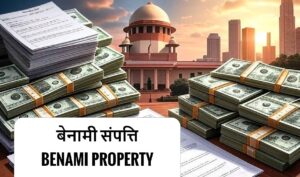The Secret of Benami Property Revealed! What Do the Supreme Court and Law Say?”
Benami property has been a serious legal and social issue in India for a long time. It refers to a property purchased in the name of one person while the real owner is someone else. To curb benami transactions, the Indian government enacted the Benami Transactions (Prohibition) Act, 1988 (amended in 2016). Recent Supreme Court judgments and legal provisions have further clarified this matter. In this blog, we will discuss the definition of benami property, the intricacies of the law, Supreme Court rulings, and the risks and precautions associated with it in detail.

What is Benami Property?
Benami property is a property bought in someone else’s name, while the actual owner is a different individual. For instance, if a person purchases a property in the name of their spouse, sibling, or friend but pays for it themselves, it is considered benami. Such transactions are often carried out to evade taxes, launder black money, or hide assets.
Key Points:
- Definition: According to the Benami Transactions (Prohibition) Act, 1988, benami property is one where the consideration (payment) is provided by one person, but the documents are in someone else’s name.
- Objective: The law aims to curb black money and expose the real owners of properties.
- Penalties: Benami properties can be confiscated, and individuals involved may face up to 7 years in prison or a fine.
Benami Transactions (Prohibition) Act, 1988 (Amended 2016)
Significant amendments were made to this Act in 2016, making it stricter. Key provisions include:
- Definition and Exceptions:
- Properties bought as gifts or under family arrangements between spouses, siblings, or parents and children are not considered benami, provided there is documentary evidence.
- If a property is in one person’s name but paid for by another without a valid reason, it will be deemed benami.
- Authority:
- The Benami Prohibition Unit under the Income Tax Department enforces this law.
- This unit has the power to investigate, confiscate, and prosecute benami properties.
- Time Limit:
- Investigations into benami transactions must begin within 1 year, and actions must be completed within 2 years (post-amendment).
- If a person voluntarily declares a benami property, they may be exempted from penalties, though this does not apply to properties acquired before 2017.
- Penalties and Confiscation:
- Benami properties can be seized by the government.
- Individuals involved may face up to 7 years in prison or a fine of up to 25% of the property’s value.
- Uttar Pradesh Building Construction and Development By-Laws 2025
- Laws Governing the Sale of Land by Scheduled Caste Landowners to General Category in Uttar Pradesh
- Understanding Section 80 (Section 143) of the Uttar Pradesh Revenue Code, 2006
- Succession Laws in Uttar Pradesh
- 12 Years of Possession (Adverse Possession) and the Property is Yours? The Complete Story of the Limitation Act and Supreme Court Rulings!
- Succession Laws in Uttar Pradesh
The Supreme Court has delivered several important rulings on benami property, clarifying the law:
- T.N. Arumugam vs. Income Tax Officer (1998):
- The court ruled that if a property is in one person’s name but paid for by another without a valid reason, it will be considered benami.
- Impact: This set a precedent for identifying benami transactions.
- Jayadev D. vs. Income Tax Officer (2018):
- The court stated that the Income Tax Department must provide solid evidence, such as bank transactions or witness statements, to prove a property is benami.
- Impact: This decision helped curb arbitrary investigations by the government.
- 2024-2025 Updates:
- In recent rulings, the Supreme Court directed the Benami Prohibition Unit to act only in cases with clear evidence. It also clarified that properties bought under family arrangements should not be deemed benami if supported by documents.
- Impact: This has brought relief to middle-class families where properties are often registered in relatives’ names.
- Constitutional Validity:
- After hearing challenges to the 2016 amendment’s validity, the Supreme Court upheld the Act’s constitutionality but suggested changes to some provisions.
Intricacies of Benami Property
Some key points related to benami property include:
- Burden of Proof: The Income Tax Department must prove that a property is benami, requiring evidence like bank records, witnesses, or transaction details.
- Family Exceptions: Properties gifted between spouses or children are exempt if properly documented.
- Tracking Black Money: Benami properties are often used to hide black money, and the government is using demonetization (2016) and digital transactions to trace them.
- Time Limit: Strict timelines for investigation and action ensure the government acts promptly.
Risks and Penalties
Owning or engaging in benami transactions carries severe consequences:
- Confiscation: The property can be seized by the government.
- Imprisonment: Up to 7 years in jail and a fine of up to 25% of the property’s value.
- Social Stigma: Being caught in a benami transaction can damage social and professional reputation.
- Impact on Family: If the property is in a family member’s name, they may also come under scrutiny.
Precautions
- Documentation: Always maintain records of property purchases and payments, clearly stating the source of funds.
- Legal Advice: Consult a lawyer before buying property, especially if it’s in someone else’s name.
- Digital Payments: Use bank transfers or checks instead of cash to maintain a transaction record.
- Declaration: If you own a benami property, voluntarily declare it to the Income Tax Department and comply with regulations.
- Regular Audits: Conduct regular audits of your property and financial transactions.
Social and Economic Impact
- Curbing Tax Evasion: The benami law is helping reduce black money.
- Middle-Class Concerns: Many families fear that properties bought under family arrangements might be labeled benami.
- Economic Effects: Confiscated properties are boosting government revenue, but they are also affecting the property market.
Conclusion
The Benami Transactions (Prohibition) Act, 1988 (amended 2016), along with Supreme Court rulings, has adopted a strict stance against benami properties. This law plays a crucial role in curbing black money and exposing real owners. However, relief has been provided for properties bought under family arrangements with proper documentation. If you are considering buying or holding property, seek legal advice and keep all documents organized.
Do you have any questions or experiences related to benami property? Let us know! Share this blog to raise awareness about this legal aspect.
Note: This information is for general awareness only. Consult a specialist lawyer for any disputes related to benami property.























